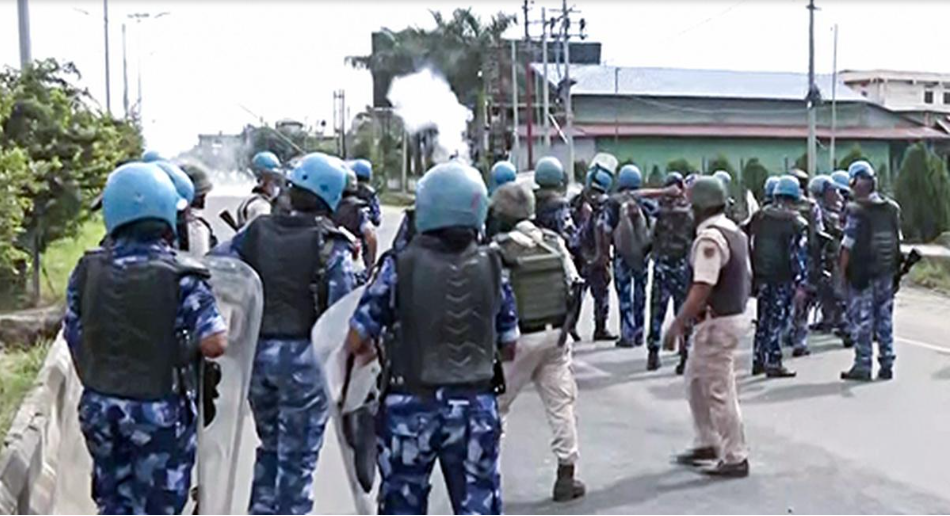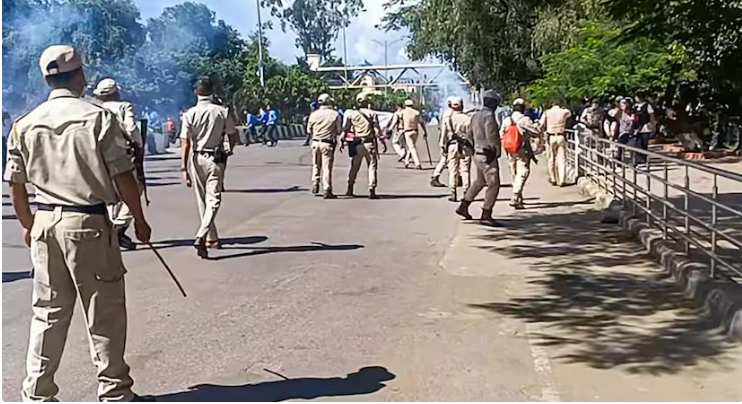Imphal, the capital of the northeastern state of Manipur, has been in the grip of turmoil in recent months, with political, ethnic, and social unrest brewing across the region. Recently, Imphal the situation took a dramatic turn when students defied a curfew, clashing with police forces in an event that left around 50 students injured. This violent encounter has sparked outrage and drawn attention to the growing dissatisfaction among the local population, particularly the youth, Imphal toward the administration. The core demands from these students include the removal of the State’s security adviser, Kuldiep Singh, the Director-General of Police (DGP) Rajiv Singh, and the resignation of all Members of the Legislative Assembly (MLAs) on moral grounds.
In response to these escalating tensions, the government has taken stringent measures, including banning internet services in five districts of the Imphal Valley and imposing curfews in two of them. This article explores the various facets of the situation, Imphal from the students’ grievances and their motivations to the government’s response and the implications for Manipur’s political and social landscape.
The Context of the Unrest
The unrest in Manipur has been brewing for several months, rooted in ethnic tensions between different communities, dissatisfaction with government policies, and growing distrust toward the state administration. The political climate in Manipur has become increasingly volatile, Imphal with frequent protests and demonstrations.
The government’s decision to impose a curfew and ban internet services in five districts — including Imphal East, Imphal West, Bishnupur, Thoubal, and Kakching — was an attempt to control the escalating unrest. However, these measures appear to have exacerbated the anger of the people, Imphal especially the youth, who view the government’s actions as a violation of their fundamental rights. Many students argue that the state’s use of force and suppression of communication is only adding to their frustrations.  For the more information click on this link
For the more information click on this link
The Students’ Grievances
The recent protests in Imphal were led primarily by students, who defied the curfew to voice their discontent. The primary demands of the students revolve around three key issues:
- Removal of the State’s Security Adviser, Kuldiep Singh: Kuldiep Singh, a retired officer of the Central Reserve Police Force (CRPF), was appointed as the security adviser to the Manipur government amid the rising unrest. However, many in the state, particularly the students, Imphal view his appointment as part of the problem rather than a solution. They accuse him of being out of touch with the ground realities and implementing heavy-handed tactics to suppress protests.
- Removal of the Director-General of Police, Rajiv Singh: Rajiv Singh, who has been serving as the DGP of Manipur, is another figure at the center of the controversy. Protesters allege that under his leadership, the police force has resorted to excessive violence in dealing with peaceful demonstrations, leading to numerous injuries among civilians, Imphal including students. The call for his removal stems from a belief that his approach has only worsened the situation.
- Resignation of All MLAs on Moral Grounds: The demand for the resignation of all MLAs in Manipur reflects a deep-seated disillusionment with the political leadership in the state. The protesters believe that the elected representatives have failed in their duty to protect the interests of the people and are calling for their resignation as an act of accountability.
The Violent Clashes with Police
The defiance of the curfew by the students led to a violent clash with the police forces. The incident took place when students gathered near the Raj Bhavan and the Chief Minister’s residence in an attempt to voice their grievances directly to the authorities. However, Imphal the police responded with force, using tear gas, batons, and rubber bullets to disperse the crowd.
Approximately 50 students were injured in the clash, with many sustaining serious injuries. The use of force by the police has been widely criticized by human rights organizations and political opponents of the current administration. The students, however, Imphal remain undeterred and have vowed to continue their protests until their demands are met.
One of the key concerns raised by the students is the manner in which the government has handled dissent. Many argue that the state’s use of force to silence protesters is indicative of a larger issue — the erosion of democratic rights in Manipur. The banning of internet services in the five districts is seen by many as a move to prevent the free flow of information and stifle the voices of dissent.
Government’s Response to the Unrest
In response to the protests and the growing unrest, Imphal the Manipur government has defended its actions, stating that the imposition of the curfew and the ban on internet services are necessary measures to maintain law and order. According to government officials, the curfew was imposed to prevent further violence and ensure the safety of the public.
The government has also justified the use of force by the police, arguing that the students were attempting to storm the Raj Bhavan and the Chief Minister’s residence, Imphal which posed a threat to public order. Officials claim that the police were left with no choice but to take action to prevent the situation from spiraling out of control.
However, critics argue that the government’s response has been disproportionate and that it has failed to address the root causes of the unrest. Instead of engaging in dialogue with the protesters, Imphal the government has chosen to suppress their voices through curfews, internet shutdowns, and the use of force.
The Role of Social Media and Internet Shutdowns
The ban on internet services in five districts of the Imphal Valley has added fuel to the fire. In the age of digital communication, the internet has become a vital tool for organizing protests, disseminating information, and raising awareness about social and political issues. The decision to shut down the internet in these areas has been widely condemned, Imphal with many accusing the government of attempting to stifle free speech and prevent the outside world from seeing the true extent of the unrest in Manipur.
Despite the internet blackout, images and videos of the clashes between students and police have found their way onto social media platforms, Imphal thanks to those with access to alternative means of communication. These videos have sparked outrage and drawn attention to the plight of the protesters, further amplifying the calls for accountability from the state government.  For the more information click on this link
For the more information click on this link
Implications for Manipur’s Political Future
The ongoing unrest in Imphal is symptomatic of a broader crisis in Manipur’s political landscape. The growing divide between the government and the people, Imphal particularly the youth, reflects a deep-seated disillusionment with the political leadership. The demand for the resignation of all MLAs is a sign of the public’s frustration with what they perceive as a lack of accountability and transparency in the government.
If the government fails to address the concerns of the protesters, the unrest could escalate further, leading to more violence and instability in the state. The situation in Manipur is also drawing national attention, Imphal with many calling on the central government to intervene and mediate a peaceful resolution to the crisis.
Conclusion
The violent clashes between students and police in Imphal are a stark reminder of the challenges facing Manipur’s political and social landscape. The demands of the protesters — the removal of key officials and the resignation of MLAs — reflect a broader sense of frustration with the state’s governance.
While the government’s actions may have been intended to maintain law and order, they have instead deepened the divide between the administration and the people. The use of force, Imphal the imposition of curfews, and the ban on internet services have only added to the anger and disillusionment felt by the youth of Manipur.
The road ahead for Manipur is uncertain, but what is clear is that the voices of the people, particularly the youth, can no longer be ignored. The government must engage in meaningful dialogue with the protesters, address their concerns, and take steps toward rebuilding trust and ensuring a more transparent and accountable administration. Failure to do so risks plunging the state into further unrest and instability, Imphal with far-reaching consequences for its political and social future. ALSO READ:-India Surrenders Meekly to Syria: A Tough Lesson for Indian Football 2024




